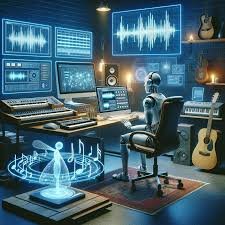The music industry has always evolved with technology, but Artificial Intelligence (AI) is now transforming the way music is created, produced, and consumed. With AI-powered tools capable of composing melodies, mimicking voices, and even mastering tracks, some wonder: Will technology replace human creativity?
One of the biggest advancements in AI music is automated composition. Platforms like AIVA, Amper Music, and OpenAI’s Jukebox can generate entire songs in different genres, often indistinguishable from human-made music. These tools analyze patterns in music and create new compositions based on existing styles. This is especially useful for film scores, video game soundtracks, and background music, where speed and efficiency matter.
AI is also reshaping music production. Tools like LANDR and iZotope Ozone use machine learning to mix and master tracks, making high-quality production accessible to independent artists. Additionally, AI-driven voice synthesis can now replicate famous singers, raising ethical questions about copyright and authenticity.
Despite these advancements, AI lacks emotional depth. While it can generate music that sounds good, it does not experience emotions, personal struggles, or cultural influences—key elements that make music deeply meaningful. Artists like Beyoncé, Kendrick Lamar, and Adele connect with audiences through personal storytelling, something AI cannot replicate.

















